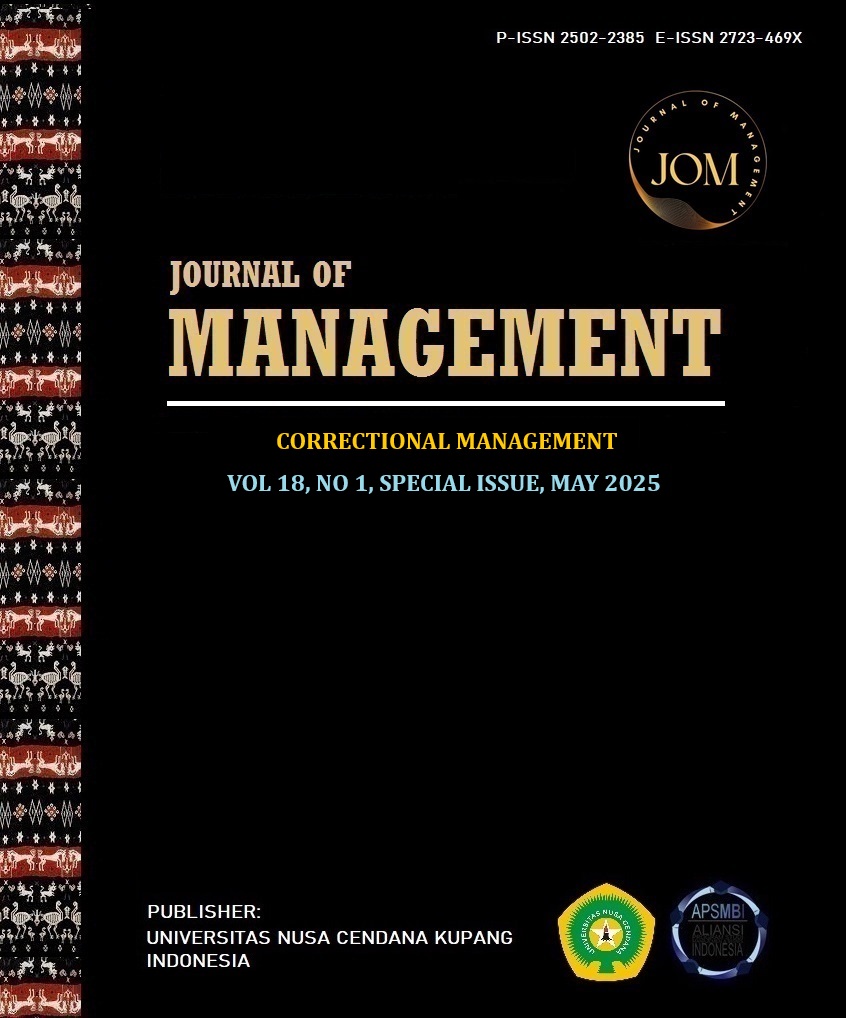IMPLEMENTATION OF EDUCATIONAL PROGRAMS FOR CHILDREN UNDER CARE AT THE CHILDREN’S SPECIAL DEVELOPMENT INSTITUTION CLASS II BANDAR LAMPUNG
Abstract
This study aims to evaluate the implementation of educational programs for juvenile inmates (Andikpas) at the Class II Special Child Development Institute (LPKA) in Bandar Lampung. The educational program at LPKA includes both formal and non-formal education designed to meet the educational rights of children in conflict with the law (ABH). The method used is descriptive qualitative research, with data collected through interviews, observations, and documentation. The results indicate that the participation rate of Andikpas in educational programs is still low, with less than 15% of children attending formal education. The Special Child Correctional Institution (LPKA) plays a crucial role in providing education to children involved in the criminal justice system. The educational programs at LPKA are specifically designed to meet the educational needs and developmental requirements of children of varying ages and levels of need. The main objective is to help these children acquire the knowledge, skills, and understanding necessary for self-improvement and building a better future. Overall, education at LPKA aims not only to provide knowledge and skills but also to help children understand and address the problems they may face, preparing them to reintegrate into society as better and more productive members. The main challenges include a lack of qualified educators, inadequate educational facilities, and low motivation among Andikpas. This research suggests the need for improvements in educational facilities, the provision of qualified teaching staff, and increased support from families and communities to enhance the effectiveness of the educational programs.
Keywords: Incarcerated Children; LPKA; Education; Development
Downloads
References
Hawa, A. P. (2021). Program Pemberdayaan Anak di LPKA Klas II Gunung Kidul, Yogyakarta. Lifelong Education Journal.
Kotler, Keller,. (2009). Manajemen Pemasyarakatan. Penerbit Erlangga Jakarta.
Lumowa, H. B. (2017). Hak Pendidikan Bagi Narapidana Anak Ditinjau dari Undang-Undang Nomor 35 Tahun 2014 Tentang Perlindungan Anak. Lex Privatum.
PERKEMENKUMHAM No.M. 02-PK.04.10 Tahun 1990 tentang pola pembinaan narapidana petugas pemasyarakatan yang melakukan pembinaan langsung terhadap narapidana, anak yang berkonflik dengan hukum dan tahanan.
Pradana, Y. (2022). Implementasi Prinsip “Kepentingan Terbaik bagi Anak” dalam proses persidangan Anak secara elektronik pada masa pandemi di Kota Jakarta Barat. Jurnal Ilmiah Hukum Dan Hak Asasi Manusia.
Ramadhania, Q., & Arisman, A. (2021). Analisis Swot Pembelajaran Anak Didik Pemasyarakatan Selama Masa Pandemi COVID–19 Di LPKA Klas 1 Palembang. PeTeKa.
Rachmat Putro Ferdiawan, Meilanny Budiarti Santoso, Rudi Saprudin Darwis. 2020. Perlindungan Hukum Bagi Anak Pelaku Tindak Pidana. Jurnal Ilmu Hukum.
Sugiyono, 2014. Metode Penelitian Pendidikan Pendekatan Kuantitatif, Kualitatif, dan R & D, CV Alfabeta, Bandung.
Sugiyono, 2014. Metode Penelitian Pendidikan Pendekatan Kuantitatif, Kualitatif, dan R & D, CV Alfabeta, Bandung.
Undang-undang Nomor 22 Tahun 2022 Tentang Pemasyarakatan.
Undang-undang Nomor 11 Tahun 2012 tentang Sistem Peradilan Pidana Anak Peraturan Pemerintah (PP) Nomor 78 Tahun 2021 Perlindungan Khusus bagi Anak.
UU No. 20 Tahun 2003 tentang Sistem Pendidikan Nasional.
Yenny, A., 2022. Program Pendidikan Karakter dalam Mengatasi Krisis Moral di Sekolah. Education Journal.

 Muhammad Aulia Rahman(1*)
Muhammad Aulia Rahman(1*)



